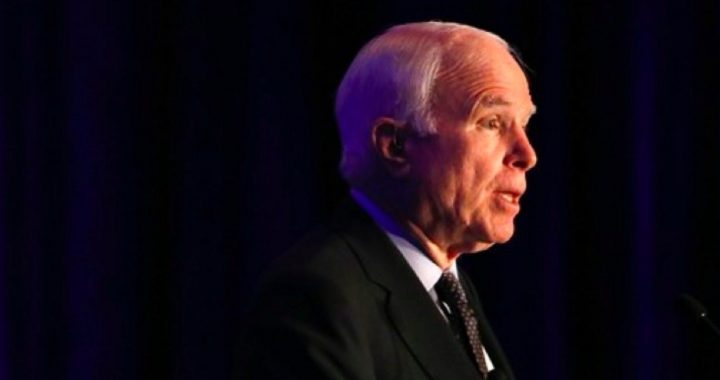
Just hours after John McCain declared his intention to run for a sixth term as U.S. senator from Arizona, the Senate Conservatives Fund launched a campaign to defeat him, presumably with a yet-to-be-determined Republican primary candidate.
“There are few Republicans who have betrayed our conservative principles more than John McCain,” SCF President Ken Cuccinelli said in an email to supporters Tuesday. Cuccinelli, the former Virginia attorney general who lost a bid for governor to Democrat Terry McAuliffe in 2013, said the party’s 2008 presidential nominee has “lost his way.”
“John McCain lost his way a long time ago and it’s time to replace him with a strong conservative leader who will support and defend the Constitution,” Cuccinelli wrote in the e-mail, which contained a link to a petition calling for a replacement for the Senate veteran, who will be 80 years old by Election Day 2016. Counting his two terms in the U.S. House, McCain, a former prisoner of war in Vietnam, has been in Congress continually since 1983. Another full Senate term would give him an even 40 years in Congress as a member of a party that in the 1990s made term limits part of a campaign for government reform. Adam Brandon, executive vice president of the conservative group FreedomWorks, said, told The Hill that while he appreciate McCain’s many years of service to the country, “at some point, you’ve got [to let] some new blood get in there.”
But it isn’t merely the mileage on McCain or his advanced age that finds him at odds with many conservatives in the Republican Party. Cuccinelli’s missive slammed the senator for his role in forging a bipartisan immigration reform bill that would allow millions of illegal immigrants to remain and work in the United States, along with his votes on various budget bills to avoid a “fiscal cliff ”by raising the ceiling on the national debt. McCain was also the co-sponsor and leading proponent of the Campaign Reform Act of 2002, the McCain-Feingold legislation. The U.S. Supreme Court ruled in 2010 that key provisions of that law violated the constitutional right of freedom of speech.
Following his defeat by Barack Obama in the presidential election in 2008, McCain has remained a leading figure in the party, especially on matters of foreign policy and military affairs, having served for many years on the Senate Armed Services Committee, which he now chairs. He has been perhaps the foremost Senate hawk, frequently calling either for direct military intervention or for arming on side or the other in a civil war. He was an enthusiastic supporter of President George W. Bush’s decision to invade Iraq in 2003 and pushed for the troop “surge” in 2007 that brought the number of U.S. troops in Iraq to more than 150,000. He supported U.S. participation in the air war over Libya in support of the rebels in Benghazi, which President Obama undertook without seeking approval of Congress. McCain and his Senate colleague and political ally Lindsey Graham (R-S.C.) later released a statement congratulating the Libyan people as well the “British, French and other allies” in the air war, while expressing regret for “the failure of the United States to employ the full weight of our airpower.”
The Libyan intervention, though successful in bringing about the downfall of Libyan dictator Moammar Gadhafi, came back to haunt the United States in September 2012 when heavily armed militants launched an attack on an American outpost in Benghazi, killing four Americans, including the U.S. ambassador to Libya. The chaos that has followed has turned Libya into another breeding ground for jihadist fighters.
McCain and Graham during the past two years were advocating U.S. intervention in the civil war in Syria, calling for the enforcement of a no-fly zone against the Syrian air force, bombing Syrian airfields and creating a “safe zone” for Syrian rebels on the Turkish border. Had their efforts succeeded in bringing about the downfall of the Assad regime, it would have turned out to be a welcome development for the militant Islamic State, since the Damascus government has been fighting ISIS in Syria.
McCain has been an advocate of expanding NATO to include more nations at or near the Russian border and has been eager to arm the Kiev government against Russian-backed rebels eastern Ukraine. He advocates a harder line and tougher sanctions against Iran over that country’s alleged nuclear weapons program, while opposing President Obama’s negotiations with the Tehran regime. He recently ncouraging Israel to “go rogue” against Iran, implying the Jewish state should launch military attacks on nuclear sites in Iran without U.S. approval or assistance.
McCain’s hawkish sentiments and policies appear to be widely shared among Republicans, with Kentucky Sen. Rand Paul, the newly declared candidate for the next GOP presidential nomination, frequently receiving criticism from McCain and others within the party for his occasional calls for less intervention in the affairs of other nations. It remains to be seen if any potential primary opponent for McCain will oppose the senator’s militarism. Two Arizona Republicans in the U.S. House, Reps. David Schweikert and Matt Salmon, told The Hill in February they are considering a primary campaign against McCain. State Sen. Kelli Ward appears serious about challenging the five-term senator, having formed an exploratory committee in anticipation of what she concedes would be a David v. Goliath campaign. In an interview with The Hill on Tuesday, she pointed out that “Goliath did not win that fight.”
McCain is not as large, but his name recognition, political connections, and fundraising ability would no doubt dwarf the value of Goliath’s armor. Whoever challenges him will need plenty of ammunition to put in David’s slingshot.
That ammunition should not be hard to find.
Photo of Sen. John McCain: AP Images



